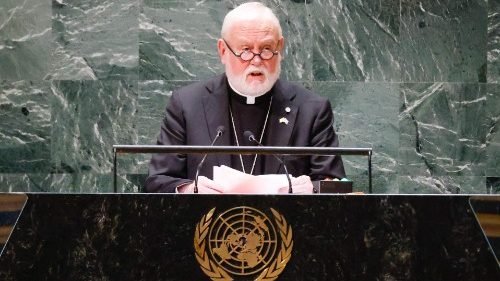The Holy See’s Secretary for Relations with States tells the United Nations General Assembly that nations must develop a “spirit of service”.
By Joseph Tulloch
The multilateral system – that is, the system of organisations, such as the United Nations and World Trade Organisation, which bring states together to discuss and make decisions – is in crisis.
That’s how Archbishop Paul Richard Gallagher, Holy See Secretary for Relations with States and International Organisations, began a recent speech to the United Nations General Assembly.
The Archbishop’s speech – which he gave at the General Debate of the UN’s High-Level Week, dedicated to the subject of “Rebuilding trust and reigniting global solidarity” – ranged over a wide variety of issues of importance to the Holy See, from the renewal of the multilateral system to the risk of bias in artificial intelligence and growing threats to religious freedom.
Multilateral forums as places of encounter
Archbishop Gallagher’s first point concerned the importance of authentic dialogue in multilateral settings.
In these forums, he said, “rivers of words are spent by delegations in order to explain their respective positions on a given issue”, but “one does not always find, on the part of individual States, the same willingness to listen.”
It is therefore necessary, Archbishop Gallagher stressed, for states to prioritise listening to the needs of other states and dialoguing with them. The “primary vocation” of global multilateral forums, he stressed, is that of being “places of authentic encounter and dialogue” between states.
States at the service of the most fragile
Participants in multilateral dialogues, moreover, the Archbishop continued, must “rediscover a spirit of service”
“To serve,” he said, “means to care for those who are fragile in our society, in our peoples. As part of this shared commitment, rulers must put aside their own needs, expectations, and desires for sovereignty or omnipotence before the concrete gaze of the most fragile.”
The nuclear threat
Another theme of the Archbishop’s speech was the “elevated threat of nuclear escalation” given the war in Ukraine.
He built further on this theme in a separate speech on the same day, an address to the UN High-level Meeting to Commemorate the International Day for the Total Elimination of Nuclear Weapons
There, he stressed that “Regrettably, the risk of nuclear war is at its highest in generations, featuring unconscionable threats of nuclear use, while an arms race runs unabated. (…) The world must reverse course. Pope Francis insists that “the ultimate goal of the total elimination of nuclear weapons becomes both a challenge and a moral and humanitarian imperative.”
Risks of new technology
Archbishop Gallagher continued his speech in the general debate with a discussion of the risks of new technologies, in particular artificial intelligence.
There is, he said, “an urgent need to engage in serious ethical reflection on the use and integration of supercomputer systems and processes in our daily lives”, as well as a need to “work to ensure that the discriminatory use of these instruments does not take root at the expense of the most fragile and excluded.”
A further problem, he said, is the development of Lethal Autonomous Weapons Systems (LAWS). It is essential, Archbishop Gallagher said, to “ensure adequate, meaningful and consistent human oversight” of such systems, since “only human beings are truly capable of seeing and judging the ethical impact of their actions, as well as assessing their consequent responsibilities.”
Human rights
The Archbishop went on to note that this year marks the 75th anniversary of the Universal Declaration on Human Rights, as well as the 30th anniversary of the Vienna Declaration and Programme of Action.
This double anniversary, he said, invites us to “an in-depth reflection on the foundation of human rights and respect for them in the contemporary world.”
Today, he stressed, there are many groups that see their “dignity denied, scorned or trampled upon”: the unborn, those denied an education or forced to work for insuffiencent pay, those detained in inhumane conditions or tortured, victims of conflict or discrimination, and many more.
Archbishop Gallagher paid particular attention to increasing restrictions on religious freedom, noting that they affect about a third of the world’s population, as well as outright persecution, which is also on the rise.
Conclusion
The Archbishop brought his address to a close with a discussion of some of conflict hotspots throughout the world of particular concern to the Holy See: Ukraine, Syria (where he called for the international community to make sure that sanctions “do not afflict the local population”), various parts of Sub-Saharan Africa, Nicaragua, Azerbaijan-Armenia, and the city of Jerusalem.
Quoting Pope Francis’ address to the United Nations Security Council earlier this year, he stressed that “today’s globalized world has brought all of us closer together, yet it has not made us any more fraternal. Indeed, we are suffering from a famine of fraternity.”
Despite this, however, “peace is possible, if it is truly willed; and if peace is possible, it is a duty.”



